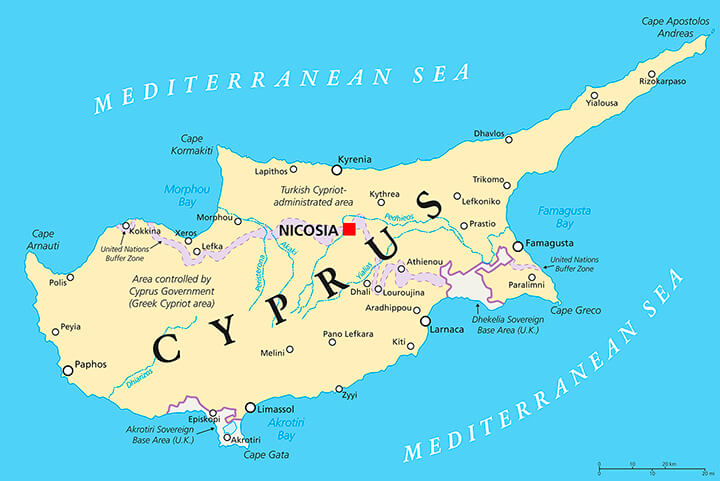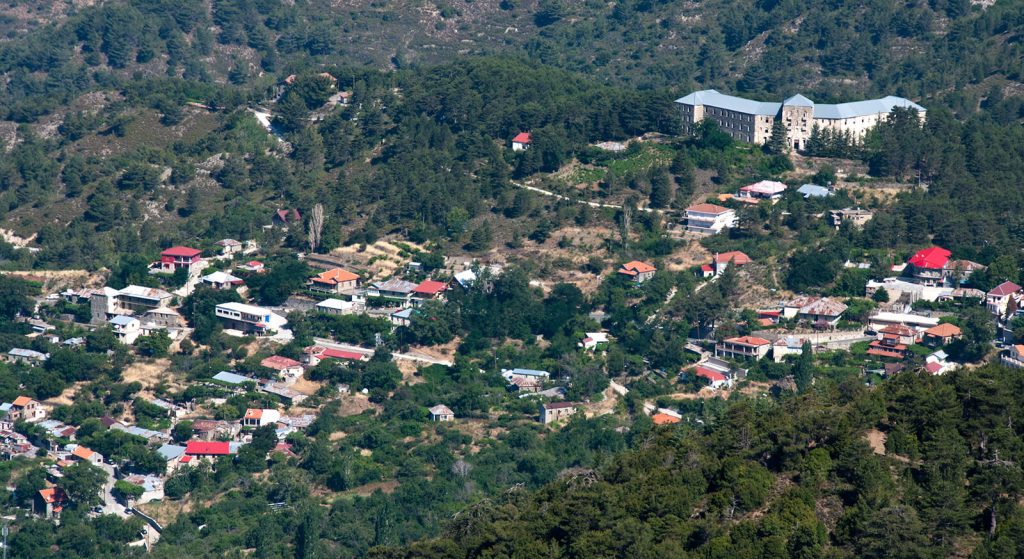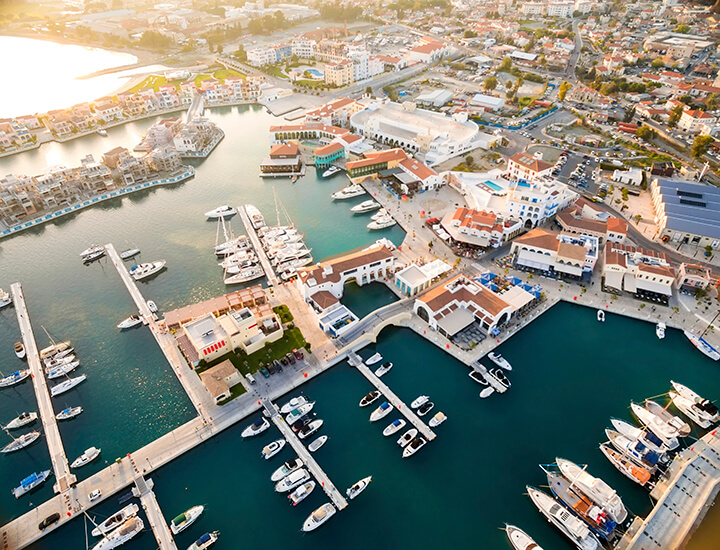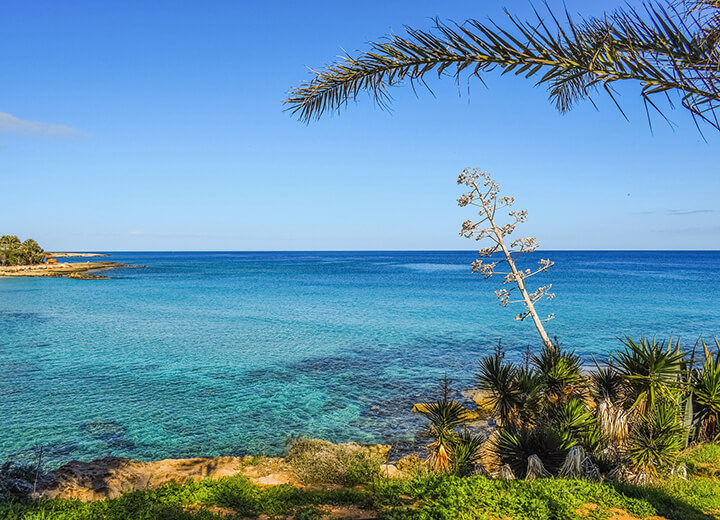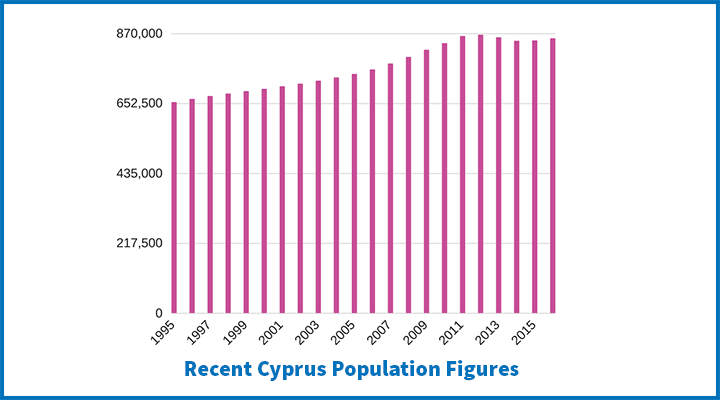This article should provide you with an overview of the major businesses and industries in Cyprus. Also covers work eligibility and prospects for finding a job when moving to Cyprus.
Table of Contents
The Cyprus Tourism Industry
The Ministry of Commerce, Industry and Tourism is responsible for the formulation and implementation of Government policy on matters regarding tourism, trade, and industry, while the Cyprus Tourism Organisation (CTO) operates offices both in Cyprus and abroad, with 22 offices in major cities worldwide promoting Cyprus.
The Cyprus tourism industry, as well as the tourism industry of other destinations, have been facing enormous challenges. With the construction of tourism development projects such as new marinas and golf courses, Cyprus tourism has started to see a steady increase in tourist arrivals.
The new Limassol marina opened at the end of 2014 and is an attractive option to open up to the yachting society.
Flights to Cyprus are numerous to both international airports of Larnaca and Paphos, and it is expected that with the completion of the tourism development projects, tourists will be enticed into seeking to explore and experience more of the wonders that Cyprus has to offer its visitors.
Other positive factors are the new Cyprus bus service, as well as more airlines operating to and from Cyprus. This service will help increase tourist arrivals to some extent, but the overall Cyprus tourism offering needs an upgrade.
Cyprus does have a lot to offer tourists, with its history and archeology, culture, beautiful scenic beaches – 53 having been awarded Blue Flag status, as well as many beaches now providing access for disabled people during the summer months. And of course, there is the beautiful biodiversity of the Troodos mountains range, not to mention the mild year-round climate. The outlook for Cyprus tourism is indeed positive.
Agriculture and Fisheries
Cyprus agriculture and natural resources account for only 2.4% of GDP (data 2008). Farming has counted less towards GDP each year for the past 20 years.
The products include grapes, deciduous fruits, potatoes, cereal grains, vegetables, olives, and carobs, while resources include pyrites, copper, asbestos, gypsum, lumber, salt, marble, clay, and earth pigment.
Livestock includes sheep, goats, pigs, cattle, poultry and livestock products. Most of the countries fish products are imported.
Citrus, grapes, wine, and potatoes were some of the top agricultural trade exports of 2008, mainly to EU countries with UK and Greece being the most significant importers, as well as Russia and the Middle East.
The Ministry of Agriculture, Natural Resources and Environment currently consists of 11 Departments and Agencies;
Agriculture Sector
- Department of Agriculture
- Forestry Department
- Agricultural Research Institute
- Geological Survey
- Department of Land Consolidation
- Veterinary Services
Natural Resources
- Department of Fisheries and Marine Research
- Water Development Department
- Meteorological Service
- Mining Service
*The environment is covered by the Environment Agency which is a Task Force of the Directorate of the Ministry.
The Department of Agriculture’s primary mission is to develop the Farmers field through training and guidance to farmers, planning and completing development programs.
The Department prepared and subsequently implemented the Rural Development program 2007 – 2013, which was an ambitious project specifically designed to revitalize the rural economy, ensuring the short and long-term future of the countryside.
The Department of Fisheries and Marine Research, the regulatory body for Cyprus fishing and marine matters, being responsible for the enforcement of the relevant legislation, it oversees the protection of endangered species and habitats.
The other main activities of the Department are related to the sustainable use of marine resources, the development and sound management of fisheries and aquaculture, the marine ecology, physical and chemical oceanography, and the prevention and combat of marine pollution.
It also promotes supporting programmes to local fishermen such as the construction of fishing shelters.
The Water Development Department is responsible for implementing the water policy of the Ministry of Agriculture, Natural Resources and Environment.
The primary objective of this policy is the rational development and management of the water resources of Cyprus. In this context, the responsibilities of the department cover a broad and diverse spectrum which includes:
1) The collection, processing, and classification of hydrological, hydrogeological, geotechnical and other data necessary for the study, maintenance and safety of the water development works.
2) The study, design, construction, operation, and maintenance of works, such as dams, ponds, irrigation, domestic water supply and sewerage schemes, water treatment works, sewage treatment and desalination plants.
3) The protection of water resources from pollution.
The Water Department has issued ten tips to save water. Please remember to implement them into your daily life. Remember – every drop of water counts.
By following many water saving measures, which require little time and money to implement, not just during drought conditions but year-round, significant amounts of water can be saved.
- Check the plumbing installation for leaks.
- Check taps for drips and make repairs promptly.
- Install plastic water bags in the toilet flush tanks.
- Take a shower instead of a bath and avoid having to run the water until it’s hot. Turn off shower water while you apply soap to your body.
- Encourage and advise children not to mess around with water in the bath, garden or anywhere else.
- Turn off the water while you shave or brush teeth.
- Wash only full loads in the washing and dishwashing machines.
- Water the garden with a watering can early in the morning or the evening when evaporation is limited.
- Wash the car with a sponge and a bucket, instead of a hosepipe, which is prohibited by Law.
- Use a broom, not a hose, to clean verandas and pavements. The law prohibits the use of a hosepipe.
Alternative energy sources and the energy sector, in general, are attracting an increasing amount of attention, while the possible existence of natural gas and petroleum reserves off the southern and eastern coast of Cyprus opens up new optimism for growth.
Offshoring in Cyprus
Cyprus has become a desirable option for international business companies. It has good relations with countries of Eastern Europe and the Middle East.
Its harmonization with the European Union, as well as tax incentives, English-based (common law) legal system, and liberalization of the distribution of capital make Cyprus attractive to foreign companies looking for headquarters for their international business activities.
The newly upgraded airports are attractive to businessmen and women and put Cyprus within easy reach of European and Middle Eastern Countries.
Incorporating in Cyprus
Cyprus Offshore companies are officially termed International Business Companies (IBC’s). A basic provision that was introduced by Law No. 15/77 states that a Cyprus incorporated company is liable to Cyprus tax on its worldwide income even if no business activity is carried out in Cyprus.
The place of incorporation is the fiscal residence of the company. This is appealing to International companies as the standard rate of Cyprus corporate tax as at 2014 is just 12.5%.
IBC’s are not permitted to conduct business within the jurisdiction in which they are incorporated
Every company is required to have a registered office and address in Cyprus as well as a secretary by law who can be a legal or natural entity. However, there are specific local companies that can provide registered legal offices for you. To register a limited liability company, Memorandum and Articles of Association must be prepared by a licensed law practitioner and filed at the Office of the Registrar of Companies.
All the rules and regulation placed by the European Union are followed, which puts Cyprus at the forefront of Enterprise Centres in the European Region. The primary objectives of the Cyprus tax reforms which are in effect today are:
- Complete harmonization with the tax system of the European Union.
- Conformity with the Code of Deontology of the OECD.
- Intensification of competitiveness of Cyprus as a Center of international activities.
Shipping is a Major Industry
There is a significant presence of shipping companies and ship management companies in Cyprus. This is because Cyprus also offers a favorable tax system to both Shipowners and Ship managers.
Under the tonnage tax system, shipping companies can opt for a tax calculated on the net tonnage of their fleet, instead of being taxed on the actual profits of their maritime activities. This puts Cyprus in the forefront to offer a very competitive overall package to shipping companies.
The dividends paid to the shareholder or the members of a corporation, out of profits made from the operation of a Cyprus ship are also exempted from the income tax, thus making Cyprus a desirable location for shipping companies.
Cyprus currently has the third largest shipping industry in the EU, and it is the tenth largest globally. The shipping sector contributes 5 percent to GDP and involves not only the flag but also maritime support services including legal, accountancy and logistics firms.
The EU Commission recently gave its approval to the tonnage taxation system operated in Cyprus and has given the green light for the order to remain in force until 2019 with the option of a further ten years until 2029. With this approval, it is expected that Cyprus will see an increase in its percentage of the world shipping market.
Cyprus Property and Construction
Building construction used to play a major in Cyprus’ economy. However, for some years the sector saw a year on year decrease in property sales.
The Cyprus Statistical Service claims that building permits constitute a leading indicator of future activity in the construction sector.
Therefore the statistics did not bode well for Cyprus future in this industry, as the stats for 2012 recorded a 33.5 percent decrease of building permits issued for the construction of new homes from the previous year (2011), and property sales plummeted.
Much of the decline in property sales, in particular to the British, can be attributed to the problems in obtaining title deeds to properties purchased, as well as the rogue practices of some property developers, lawyers, and banks.
The British High Commission was prompted to issue a warning to potential Cyprus property purchasers, stating that
Many British nationals have purchased property in Cyprus without too much difficulty. However, the process of buying land or property in Cyprus can have many potential pitfalls.
The British High Commission advises potential purchasers to exercise extreme caution when buying a property if the title deeds are not readily available, as to do so means that your property could be at risk.
If you are thinking to buy land or property in Cyprus, the best advice we can offer is first take some time out to read the many articles on the Cyprus Property News website.
This independent website is owned and operated by the very knowledgeable Nigel Howarth, who can offer opinion and guidance on buying real estate in Cyprus.
Potential Cyprus property buyers should also note the following;
On 20th October 2006, the government of the Republic of Cyprus passed Article 303A of the Criminal Code which makes it a felony to buy, rent or sell property in Cyprus without the consent of the registered owner.
Cypriot courts have used the law to prosecute people involved in the sale or purchase of property in the area administered by the Turkish Cypriots (Occupied North Cyprus). The government of Cyprus has also attempted to enforce Cypriot legal judgments in property matters in other EU countries.
Cypriot customs authorities routinely detain anyone arriving in Cyprus or crossing the buffer zone found to be in possession of documents relating to property purchases in the area administered by Turkish Cypriots.
The court ruling in January 2010 that ordered British couple Linda and David Orams to demolish the villa they had built on land in Lapithos belonging to Greek Cypriot refugee Meletis Apostolides, should serve as a strong warning in this matter.
The Building Industry is Picking Up
From around 2016, the building trade has picked up again, and Cyprus (especially Limassol area) is now seeing many high rise buildings of apartments and offices going up.
Opinion is somewhat divided over whether or not this is a good thing for Cyprus. Many think its great because it reduces the very high unemployment rate.
Others feel that so many high-rise buildings are ruining the character of Cyprus. Like it or not, it is happening and at a high-speed. The majority of property purchasers in Limassol are from Russia.
New Roads and Infrastructure
The Ministry of Communications and Works (Public Works Department) has completed many upgrades of road networks and constructions of new roads, such as the construction of a new Nicosia ring road.
This is a major infrastructure project aimed at easing the current traffic congestion. A four-lane, 32 km, ring road, connects the Nicosia-Limassol highway to the Nicosia-Troodos motorway, as well as serving as an outlet for the secondary road network.
The Department is responsible for:
- Designing and management of designs that are carried out by the private sector, supervision of construction and maintenance of roadworks, including motorways and other primary and secondary roads.
- Designing and management of designs that are carried out by the private sector, construction and supervision of construction, improvement, and maintenance of government buildings.
- Development, improvement, extension and maintenance works of Larnaca and Paphos airports.
- Designing and monitoring the construction of works for coastline defenses and fishing shelters.
- Preparation of traffic studies in urban and rural regions in collaboration with other Government Departments, Local Authorities and Consulting Engineers.
- Design and construction of flood-prevention measures.
- Design, construction and/or supervision of construction of road projects in industrial zones and social housing schemes.
- Maintenance of residences and other buildings in refugee housing schemes as well as supervision of construction of residences that are built as part of the Plan for Self-built shelter and issuing of relevant progress certificates.
- Construction and maintenance of defense works and other projects within the Military Camps, as well as repair and maintenance of installations of UN Peace Force in Cyprus.
- Laboratory testing (investigations, trials etc.) of construction materials both for public work and for private projects, in accordance with the relevant specifications.
- Checking of public buildings and of facilities for storing petroleum products, according to the relevant Legislation.
- Review of applications for planning and building permits for land division purposes.
- Examination and resolution of problems/demands of local communities or private individuals resulting from the implementation of road projects.
- Provision of technical advice to other Ministries, Departments, Services, Organisations as well as to private individuals.
- Participation and representation of the Department in various Technical Committees such as the Committee of Cypriot Standards, the Central Committee for Variations and Claims, the Rent Committee, Judging Committees for Architectural Competitions, etc.
Working in Cyprus
With Cyprus being a full EU member country, anyone from any other EU member country has the right to work in Cyprus as an employee or self-employed, or they may relocate an existing business to Cyprus, or set up a new company. No work permit is required. However, people from non-EU countries face different regulations.
Work Eligibility Requirements
To work in Cyprus, you must apply to your local District Labour Office to register for social insurance. As an employee, the social insurance payments will be deducted from your salary by your employer and paid to the Social Insurance Fund. The employer also contributes to the Social Insurance payable. The Social Insurance Scheme is financed by the contributions paid by the employers, the employees, and the State.
The rate of contribution for employed persons is 17.9% of which 6.8% is payable by the employee, 6.8% by the employer, and 4.3% out of the State budget. For self-employed persons, the rate is 16.9% of which 12.6% is payable by the self-employed person and 4.3% out of the State budget.
The rate payable for Individual Income Tax is Up to 19.500 Euros – 0. 19.501 to 28.000 Euros – 20%. 28.001 to 36.300 Euros – 25%. 36.301 to 60.000 Euros – 30%. 60.001 Euros and over – 35%. These rates are current as of October 2012, but may have changed since publishing; we will amend this page when we have the relevant information.
EU citizens must also apply for a residence permit if they intend to stay longer than three months and take up employment in Cyprus. You can apply for a residence permit (Yellow Slip) at your local Immigration Department.
Cyprus Social Insurance (in pdf format, may not be compatible with mobile devices) (latest version available is from 2015)
Finding Employment in Cyprus
When planning to work in Cyprus, you should seriously consider how you will survive financially if you do not manage to gain employment. It is not so easy to find jobs in Cyprus for English speakers. There are few jobs around. However, if you do not speak or write Greek, then you are facing a significant disadvantage. Also, the global recession and Cyprus’ economic crisis has meant fewer jobs being available in Cyprus, and unemployment has reached an all-time high.
The best ways to find jobs are via the local newspapers, recruitment agencies, and online recruitment websites, or your local department of labor office. However, you must be prepared to be patient, as many employers do not even bother to reply to applications that were not successful.
If you use local online forums and free classifieds websites to look for jobs in Cyprus, you should be aware that there are many scams around that can trick you into giving your personal details for their illicit use, or you could end up being part of a money laundering operation. Be acutely aware; if something seems too good to be true, then it probably is, some of the best scams can appear to be completely legitimate, so do some research on the company first.
Wages and Pay in Cyprus
The pay in Cyprus is meager in comparison to similar jobs in the UK. However it is favorable to many eastern European workers, and so you should recognize the competition you are up against. The minimum wage as of 1st April 2012 for employees who have been at their place of employment for over six months, is €924.
While the minimum wage for new employees, who have been working at their place of employment for less than six months is €870 (gross) monthly. This applies only to sales staff, clerical workers, auxiliary healthcare staff and auxiliary staff in nursery schools, crèches, and schools. The minimum wage rate is reviewed every year, and any changes take effect from 1st April.
It is not compulsory for employers to provide the employee with a contract of employment, however many employers of foreign workers do provide a contract. The document should contain information about the place of work, the registered address of the organization/company, your job and duties, the date of the commencement and, if agreed, of the termination of your employment, holidays with pay, earnings, and allowances and working hours and days.
Hours of work will vary depending on the type of work, however, to generalize, working time ranges from 38 to 40 hours per week in most companies. Overtime should be paid for work performed outside the specified working hours. However, we have observed that many will expect you to work outside of your regular working hours, but do not pay for it.
According to the law, as stated by the Minister of Labour and Social Insurance Sotiroula Charalambous (April 2010), shop employees should not work more than eight hours a day, with the total hours worked per week not exceeding 38. Overtime should not exceed two hours per day, and should not exceed a total of eight hours per week, and should be paid at double the hourly rate of normal employment for public holidays, Sundays and on agreed free mornings or afternoons. At other times overtime should be rewarded at 50 percent above the standard hourly rate.
If you are planning to set up a company/business in which you will be self-employed, or if you plan on moving your existing company to Cyprus, you should seek out legal professionals to help you so that you avoid mistakes/problems later.
